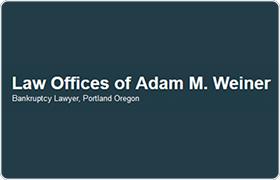Aurora Collection Lawyer, Oregon
Sponsored Law Firm
-
 x
x

Click For More Info:
-
Law Offices of Adam M. Weiner
8624 SE 13th Ave Portland, OR 97202» view mapBankruptcy & Debt Premier Bankruptcy Attorney
Life doesn’t always have to be hard. Consult with a bankruptcy attorney who looks out for your best interests. Call today to begin the process for a fresh financial start.
503-719-5123
Adam M. Weiner
✓ VERIFIEDBankruptcy & Debt, Credit & Debt, Collection
Adam Weiner has been practicing law in Oregon since May 1998. After successfully spending many years representing individuals in different types of... (more)
David Smith
Corporate, Business Organization, Banking & Finance, Collection
Status: In Good Standing Licensed: 28 Years
Amber N Wolf
Bankruptcy, Employment, Collection, Credit & Debt
Status: In Good Standing Licensed: 22 Years
Hafez Daraee
Family Law, Civil Rights, Corporate, Collection
Status: In Good Standing Licensed: 31 Years
A. Richard Vial
Construction, Aviation, Civil Rights, Collection
Status: In Good Standing Licensed: 43 Years
Thomas Matthew Johnson
Commercial Real Estate, Litigation, Civil Rights, Collection
Status: In Good Standing Licensed: 31 Years
Paul B Barton
Construction, Civil Rights, Corporate, Collection
Status: In Good Standing Licensed: 58 Years
Paul Bruce Barton
Construction, Civil Rights, Corporate, Collection
Status: In Good Standing Licensed: 58 Years
Edward Louis Ferrero
Estate Planning, Civil Rights, Credit & Debt, Collection
Status: In Good Standing Licensed: 34 Years
 Adam M. Weiner Portland, OR
Adam M. Weiner Portland, OR Practice AreasExpertise
Practice AreasExpertise

